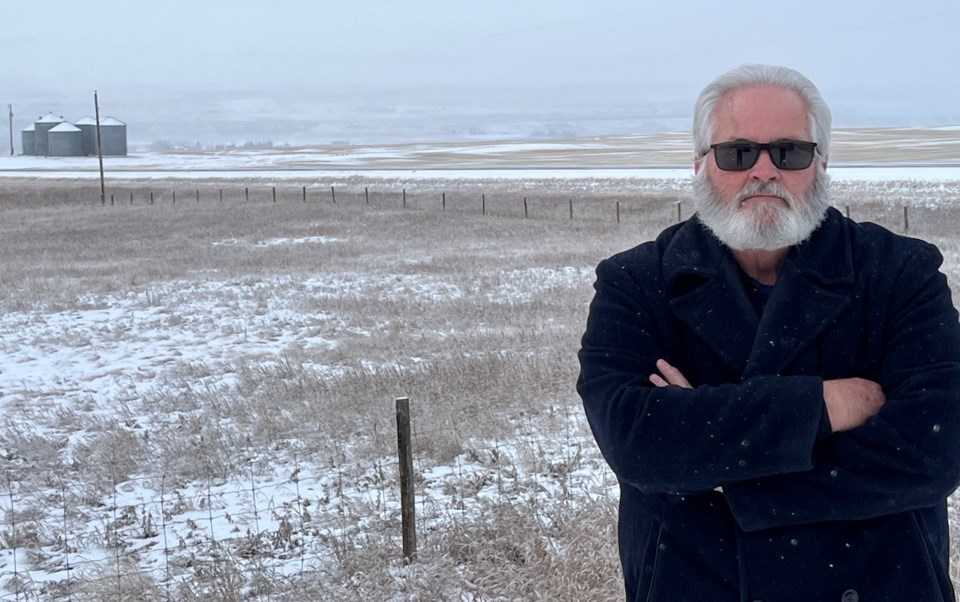OKOTOKS: A woman’s cries for help went unanswered even though a rural resident called 911 after hearing what he describes as desperate screams.
Gladys Ridge resident Rob Laird said he returned home from Okotoks on Nov. 21 around 7 p.m. and saw a white car parked in a field across the road. The same one he noticed when he left earlier.
Laird said when he got out of his vehicle, he heard a male and female voice and walked down to the end of the driveway to see what was going on.
“The female started to scream a loud terror filled scream yelling, ‘Help me! Help me!” Laird recounted. “So, I called 911.”
He said he was transferred to the RCMP Operational Communications Centre (OCC) and was told the call would be dispatched to the High River RCMP, even when Laird explained the Okotoks detachment was closer. The operator then said she would hang up and the RCMP would call Laird back.
After about a minute of screaming, Laird said there was nothing but silence.
“The girl had stopped screaming and then nothing, very, very quiet,” he said. “That was the disconcerting part.”
The retired RCMP officer said in the past, he would have gone to investigate himself, but said as he’s gotten older, he’s become more cautious.
He waited 14 minutes for a call back and then he heard the car start up and drive away.
“The car takes off with gravel flying and heads east towards the Blackie area,” Laird said.
He again calls 911 and is transferred to the same operator in Red Deer and describes the car, tells her it had a very loud muffler and its direction of travel. When he told the operator that he hadn’t heard from the RCMP detachment yet, he said the operator told him he needed to be patient.
“A few minutes later, a police car came and went to the field and then took off east and then a few minutes later got a call from that officer asking for a description of the car,” Laird said.
More officers came to the field where the car was and looked around.
“The corporal calls and says, we haven’t found any blood or anything… I called 911 because I considered this a life-and-death situation,” he said. “I thought the response from the corporal was pretty unprofessional. It’s a ridiculous statement. It shows the lack of investigation. If somebody is in the car and they are injured, it might not be in the field.”
After a week, Laird hadn’t heard back from anyone at the High River detachment, so he called and said he was told that they had done patrols, but the car was not located.
However, Laird said overall the RCMP is not at fault in this situation. He said, in his opinion, the response from the OCC operator, hanging up on him and not dispatching police from the closest detachment contributed to the delay in police getting to the scene in time.
Cpl. Tammy Keibel, media relations officer for the Southern Alberta District, said there could be many factors that influence how the call is handled and what detachment is dispatched.
“It just depends if it’s a situation where another member hears at the call and are in a better position to respond, they may opt to take that call and that could affect the response time,” she said.
How the call is classified determines whether the operator will stay on the phone with the caller, Keibel said.
“The call goes in and it is given a priority based on the information,” she said. “It just depends on the nature of the call. There is lots of factors that are going to impact the priority of the call depending on the information that dispatcher or caller receives.”
There are five categories for calls ranging from those that require immediate response to those that have an urgent need for police, to those that can be dispatched as soon as possible. The last two categories require follow-up by police officers as they are non-urgent or the crime has already occurred.
Laird said he also reached out to Highwood MLA RJ Sigurdson, who toured the province with the justice minister to talk about rural crime.
Sigurdson is co-chair of Alberta’s rural crime committee with the justice minister, Kaycee Madu.
Laird said he was told several times that Sigurdson would get back to him but didn’t hear back until almost two weeks later.
The MLA’s response was inadequate, he said.
“The government is not responding back, again, (Sigurdson) knows that I’ve called and he knows this story," Laird said. "He’s got his blinders on. He doesn’t seem to want to be accountable.”
After being contacted by the Western Wheel, Sigurdson emailed a statement, which said in part, “Response to rural crime in our area is of great concern to our community and its residents. I share the concern and frustration with the constituents of Highwood. The matter of response was brought to my attention last week by Mr. Rob Laird and is one that I receive multiple emails and communications about every week.”
The statement also referenced the Rural Alberta Provincial Integrated Defense (RAPID) force created by the Province to expand the power of sheriffs and wildlife enforcement officers to respond to certain situations and the proposal for a Provincial police force.
Laird said in the end, he doesn’t blame the RCMP for the response in this case but wants the dispatch system to improve.
“Whatever happened, this vehicle got away,” he said. “Somebody’s life may have been in danger.”



